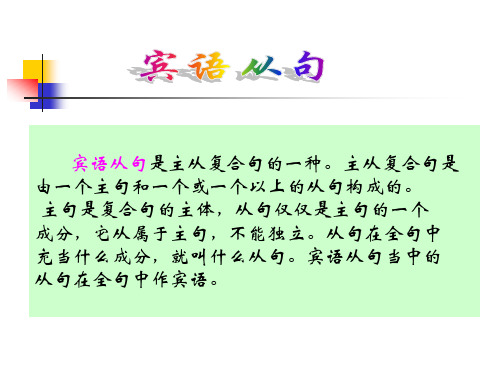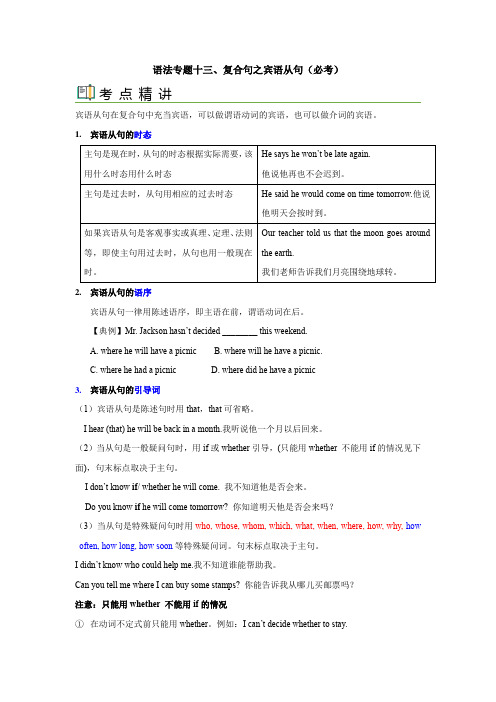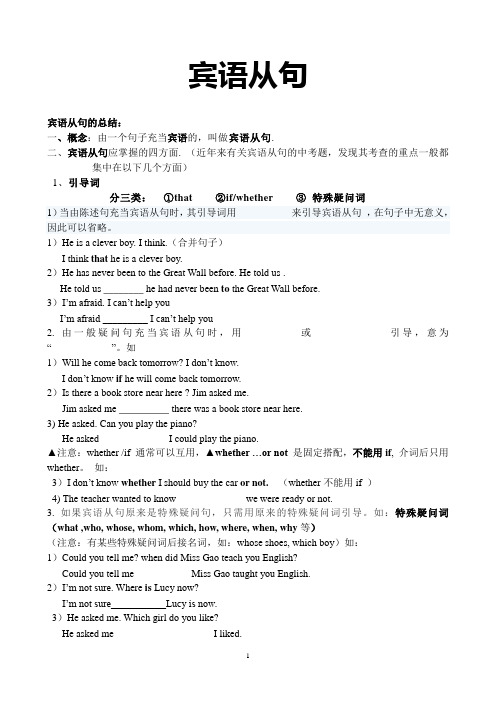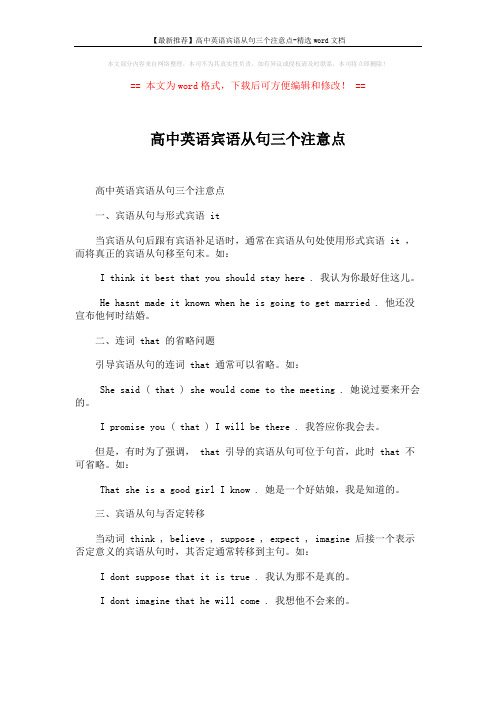一、宾语从句
宾语从句是主从复合句的一种主从复合句是由一个主句和一

7) Jim doesn’t understand __B_____. A. which is the way to the museum B. why his wife always goes shopping C. what is the way to the museum D. why does she always go shopping
Example: ----Has Tom been here ? ----No. I don’t know if hewill come (come)here . ----I will call (call)you if he comes (come).
注意:
When表“当……时”时,是状语从句。
-- I’ll show you.
3 – I am not sure when / whether Tony will come or not.
-- No, he isn’t. 4 – I want to know how long / old
he is. -- He is ten years old.
→现在完成时Fra bibliotek→一般过去时
→
过去进行时 过去完成时 过去完成时
一般将来时
→
过去将来时
三、宾语从句注意事项
(一)当从句的原句为以下句子以及what, who作主语时,语序不变:
What’s wrong? What’s the matter? What’s happening? eg:I don’t know what’s the matter.
语法专题十三 宾语从句【考点精讲精练】-2023年中考语法一点通(教师版)

语法专题十三、复合句之宾语从句(必考)宾语从句在复合句中充当宾语,可以做谓语动词的宾语,也可以做介词的宾语。
1.宾语从句的时态主句是现在时,从句的时态根据实际需要,该用什么时态用什么时态He says he won’t be late again.他说他再也不会迟到。
主句是过去时,从句用相应的过去时态He said he would come on time tomorrow.他说他明天会按时到。
如果宾语从句是客观事实或真理、定理、法则等,即使主句用过去时,从句也用一般现在时。
Our teacher told us that the moon goes around the earth.我们老师告诉我们月亮围绕地球转。
2.宾语从句的语序宾语从句一律用陈述语序,即主语在前,谓语动词在后。
【典例】Mr. Jackson hasn’t decided ________ this weekend.A. where he will have a picnicB. where will he have a picnic.C. where he had a picnicD. where did he have a picnic3.宾语从句的引导词(1)宾语从句是陈述句时用that,that可省略。
I hear (that) he will be back in a month.我听说他一个月以后回来。
(2)当从句是一般疑问句时,用if或whether引导,(只能用whether 不能用if的情况见下面),句末标点取决于主句。
I don’t know if/ whether he will come. 我不知道他是否会来。
Do you know if he will come tomorrow? 你知道明天他是否会来吗?(3)当从句是特殊疑问句时用who, whose, whom, which, what, when, where, how, why, how often, how long, how soon等特殊疑问词。
宾语从句1

宾语从句:(一)一.结构:主句+引导词+宾语从句二.语序:宾语从句要用陈述句语序三.时态:1.主句是一般现在时,从句不受影响2.主句是一般过去时,从句用相应的过去时态3.如果从句表达的是客观事实和真理则用一般现在时。
四.宾语从句根据引导词分为三类:(一)that引导陈述句,that可省略1.“I want to visit Sanya.” Tom said.Tom said that he wanted to visit Sanya.2.The races were interesting. Bill thinks.(合并为一句)Bill thinks that the races were interesting.3.Jack告诉我他将要回来。
Jack told me _____ he _____ ______ back.4.爸爸说一周有七天/光的速度比声音快Dad said _____ _____ _____ seven days in a week.The teacher told us _____ the light ______ faster than the sound. (二)if 和whether (是否)引导一般疑问句,并把一般疑问句改为陈述句语序。
当从句中出现or, or not, to do 的时候,只能用whether不能用if1.“Do you like English?” she asked me.She asked me if/whether I liked English.(注意人称的转换)2.Have you finished your homework? The teacher wants to know.改为含宾语从句的复合句The teacher wants to know________________ your homework.3.I wonder _____ he can play soccer or not.(是否)4.______ ____ ____ you can do this well depends on your learninghabits.(是否)5.She asked ______ ______ finish it herself.(是否)。
宾语从句1

宾语从句宾语从句的总结:一、概念:由一个句子充当宾语的,叫做宾语从句.二、宾语从句应掌握的四方面. (近年来有关宾语从句的中考题,发现其考查的重点一般都集中在以下几个方面)1、引导词分三类:①that ②if/whether ③特殊疑问词1)当由陈述句充当宾语从句时,其引导词用___________来引导宾语从句,在句子中无意义,因此可以省略。
1)He is a clever boy. I think.(合并句子)I think that he is a clever boy.2)He has never been to the Great Wall before. He told us .He told us ________ he had never been to the Great Wall before.3)I’m afraid. I can’t help youI’m afraid _________ I can’t help you2. 由一般疑问句充当宾语从句时,用___________或_______________引导,意为―____________‖。
如1)Will he come back tomorrow? I don’t know.I don’t know if he will come back tomorrow.2)Is there a book store near here ? Jim asked me.Jim asked me __________ there was a book store near here.3) He asked. Can you play the piano?He asked _____________ I could play the piano.▲注意:whether /if 通常可以互用,▲whether …or not 是固定搭配,不能用if, 介词后只用whether。
宾语从句课件高三英语一轮复习

宾语后置:
(1)动词+介词短语+宾语
常用结构: accept…as see…as… elect…as… bring…to… recommend…to…
view…as define…as… recruit…to… extract…from…
宾语后置:
(2)动词+adj.+宾语
宾语从句
Object clause
什么是宾语?
He said something . He passed the exam.
宾语
位置:动词后 形式:往往是名词、代词
什么是宾语从句?
He said something . He passed the exam. He said that he passed the exam.
双宾语:
Economic advances offer the aging population a better life. 经济的进步给老年人更好的生活
解释: give 作为谓语 老年人是一个宾语 更好的生活是第二个宾语
补充3: 宾语后置
(1)动词+介词短语+宾语
(2)动词+adj.+宾语 (3)动词+it+adj./n.+宾语
The abstract concept makes possible some concrete understanding.
宾语后置:
(3)动词+it+adj./n.+宾语
Our brain finds it inefficient to keep all smell receptors working all the time. 常用动词: make, find, consider, think
宾语从句
【最新推荐】高中英语宾语从句三个注意点-精选word文档 (1页)

【最新推荐】高中英语宾语从句三个注意点-精选word文档本文部分内容来自网络整理,本司不为其真实性负责,如有异议或侵权请及时联系,本司将立即删除!== 本文为word格式,下载后可方便编辑和修改! ==高中英语宾语从句三个注意点高中英语宾语从句三个注意点一、宾语从句与形式宾语 it当宾语从句后跟有宾语补足语时,通常在宾语从句处使用形式宾语 it ,而将真正的宾语从句移至句末。
如:I think it best that you should stay here . 我认为你最好住这儿。
He hasnt made it known when he is going to get married . 他还没宣布他何时结婚。
二、连词 that 的省略问题引导宾语从句的连词 that 通常可以省略。
如:She said ( that ) she would come to the meeting . 她说过要来开会的。
I promise you ( that ) I will be there . 我答应你我会去。
但是,有时为了强调, that 引导的宾语从句可位于句首,此时 that 不可省略。
如:That she is a good girl I know . 她是一个好姑娘,我是知道的。
三、宾语从句与否定转移当动词 think , believe , suppose , expect , imagine 后接一个表示否定意义的宾语从句时,其否定通常转移到主句。
如:I dont suppose that it is true . 我认为那不是真的。
I dont imagine that he will come . 我想他不会来的。
新概念英语第一册语法知识点:宾语从句
新概念英语第一册语法知识点:宾语从句宾语从句一、重要语法:宾语从句1、宾语从句本课侧重的是由特殊疑问词引导的宾语从句的用法,主要的疑问词有if/whether/how/why/what/when/where等。
如:I don't know when I'll finish.My wife wants to know if Mary needs any help. I don't know what you'retalking about.二、课文主要语言点Is that you, John? Yes, speaking. 注意打电话时的习惯用语。
如果电话接通后,要找某人接电话,一般可以说:May Ispeak to sb.? 也可以像课文里这样直接询问对方是否就是你要找的人:Is that you, sb.?如果接电话的人正是对方要找的人,则可回答:This is sb.speaking.或者简单回答:Speaking。
原文中的speaking就是简短回答,其完整形式为:This is John speaking.Tell Mary we'll be late for dinner this evening. 1)tell sb.sth.,tell为双宾动词,可以改为:tell sth. to sb.。
但是,当直接引语为句子时,只能用tell sb. sth.(从句)的结构2)belate for,迟到。
I'm afraid I don't understand. I'mafraid后接宾语从句,省略了连接词that。
这是形容词后接宾语从句的用法,that一般都会省略。
如:I'm sure he will come here on time tomorrow. 需要注意的是,当I'mafraid要翻译成中文时,不要译为“我恐怕”,而要译为“恐怕”,这样比较符合中文的表达习惯。
宾语从句完整归纳(1)
必备英语宾语从句完整归纳一、初中英语宾语从句1.—Do you know ?—Let me see. I remember it was on March 18th.A.why did they move here B.why they moved hereC.when did they move here D.when they moved here【答案】D【解析】【详解】试题分析:句意:---你知道他们什么时候搬到这儿吗? --让我想想。
我记得那是在三月十八日。
在宾语从句中只能用陈述句语序,不能用疑问句语序。
结合答语中I remember it was on March 18th可知该选D。
考点:考查宾语从句。
2."I want to know ." said the boy opening the box.A.what's inside the box B.where the box isC.that there's some candy D.how big is the box【答案】A【解析】句意:“我想知道盒子里边是什么”这个男孩打开盒子说。
本题考查宾语从句。
宾语从句的语序是陈述语序,排除D;根据句意排除B,C故选A。
3.—We are going to visit Mary. She has been ill for a week. Could you tell me ______?—I’m not sure. Maybe we can help her with math first.A.how can we make her happyB.how we can help her with the lessonsC.when we will go to her homeD.where she lives【答案】B【解析】【详解】句意:——我们打算去看望玛丽,她病了一个星期了。
宾语从句专题(含答案)(1)
3.—Can you tell me _____________?
—Of course. Japan.
【答案】C
【解析】
句意:——为什么简似乎很担心?——她不确定她是否能得到一份好工作,尽管她是一名优秀的学生。be uncertain about表示不确定,后面接的宾语从句,用疑问句,位于介词about后,故用whether引导,故选C。
7.一Could you please tell me?
一In two hours.
A.what’s his jobB.where does he come from
C.where he is fromD.what language he speaks
【答案】C
【解析】
这题考查疑问句做宾语从句的用法,宾语从句要变成陈述句语序,在根据答语:Japan,说明是问从哪里来的。选C。
4.—I'd like to know ________ for the party.
【答案】C
【解析】
句意:——打扰了,你能告诉我我明天早上在哪里能找到你吗?——在我们学校的大门口前面。what time should we arrive at the park我们应该几点到达公园?where should we meet我们应在哪里见面?where I can find you tomorrow morning明天我能进在哪里找到你?what we need to take with us我们需要随身带什么?根据In front of the gate of our school.可知此处对地点提问,特殊疑问句作为宾语从句时,词序用陈述语序:疑问词+主语+谓语+宾语,故选C。
(高一)宾语从句_表语从句9
(3)由that 引导的两个及两个以上的宾语从 句时,第一个宾语从句的引导词可以省略 ,但其他的that不能省略。
She promised (that) she would come and see him, and thm.
7. _W__h_e_t_h_e_r_ this is true or not, I can’t say.
Practice time
if / whether 1. I asked her i_f_/__w_h__e_th__e_r__ she had
a bike. 2. We’re worried about _w_h__e_th__e_r he is
moves around the sun.
(2).当that在except, in,but等介词之后时, 不能省略。
④ They believe in _t_h_a_t she must still be
single. ⑤ I know nothing about him except _th_a_t_ he
2. Please tell me ____C___.
A. what does he like B. what he does like
C. what he likes
D. what he like
3. My sister told him ____B____ .
A. what day was it
主句+连接词+从句(主+谓+其他成分) 判断下列哪一句是正确的
1. When will he go to the library? His brother asks when he will go to the library . His brother asks when will he go to the library . 2. What did he want to buy ? I don’t know what did he want to buy . I don’t know what he wanted to buy .
- 1、下载文档前请自行甄别文档内容的完整性,平台不提供额外的编辑、内容补充、找答案等附加服务。
- 2、"仅部分预览"的文档,不可在线预览部分如存在完整性等问题,可反馈申请退款(可完整预览的文档不适用该条件!)。
- 3、如文档侵犯您的权益,请联系客服反馈,我们会尽快为您处理(人工客服工作时间:9:00-18:30)。
Page 1 of 18 语法要点 一、从句 (一)宾语从句 1、主从句时态照应规则 ① 当主句是现在时态时,从句可以是任何时态 He says that he is going to the US. ② 主句是过去时态时,从句必须是表示过去的某种形式 1) She will go to Beijing next week. She told us She told us that she would go to Beijing next week. 2) What do you say? She asked me She asked me what I said. 3) They are playing computer games. They said They said that they were playing games. ③ 尽管主句是过去时,如果从句表示客观真理时,仍用一般现在时 1) He said that the earth goes/moves/travels around the sun. 2) The teacher told us light travels faster than sound. ④ 在think, believe等引导宾语从句时,如果需要否定从句,要否定主句. I don’t think you are a good man. 2、句式变化规则 ① 当陈述句作宾语从句时,用that引导。(可省去) He told us that he was coming next week. ② 当一般问句作宾语从句时,用if/whether引导,并要将问句语序改为陈述句语序。 1) Does he live here? I want to know. I want to know if/ whether he lives here. 2) Do you speak English? Can you tell me? Can you tell me if you speak English? 3) Will you come here tomorrow? I want to know. I want to know if you will come here tomorrow. 4) Did they see the film last night? Can you tell us? Can you tell us if they saw the film last night? 5) Have you been to the US? Please tell us. Please tell us if you have been to the US. 6) Can she speak English? Do you know? Do you know if she can speak English? Page 2 of 18
7) Is there an apple on the desk? She asked me. She asked me if there was an apple on the desk. ③ 当特殊问句作宾语从句时,用特殊疑问词引导,并要将问句语序改为陈述句语序。 1) Which book does he like? Please tell me. Please tell me which book he likes. 2) How long has he been here? I want to know. I want to know how long he has been here. 3) What do you want? She asked me. She asked me what I wanted. 4) Who is your teacher? She asked me. She asked me who was my teacher. 3. 直接引语与间接引语 直接引语即引述别人的原话。间接引语即用自己的话转述别人的话 1)人称的变化 直接引语 间接引语 第一人称 与主句主语人称一致 第二人称 与主句宾语人称一致 第三人称 不变 He said,“I am very busy.” He said that he was very busy. She said to me,“What are you doing?” She asked me what I was doing. 2) 时态的变化 直接引语 间接引语 一般现在时 一般过去时 现在进行时 过去进行时 现在完成时 过去完成时 一般过去时 过去完成时 过去完成时 过去完成时 一般将来时 过去将来时 表示客观真理 一般现在时
He said ,“I saw the film yesterday.” He said that he had seen the film the day before. Page 3 of 18
3) 指示代词、时间状语和地点状语的变化 直接引语 间接引语 指示代词 this that these those
时间状语 now then today that day tonight that night this week that week yesterday the day before last week the week before three days ago three days before tomorrow the next day next week the next week ago before 地点状语 here there 动词 come go 4)句式的变化 直接引语 间接引语 陈述句 主语+said/told sb.+ that„ 一般问句 主语+asked (sb.) if/ whether+陈述句 特殊问句 主语+asked (sb)+疑问词+陈述句 祈使句 主语+asked/told sb.(not) to do„ He said to me,“Are you going to Beijing tomorrow?” He asked me if I was going to Beijing the next day. “Don’t come here next week.”the old man said to them. The old man told them not to go there the next week. The teacher said to us, “Sit down ,please.” The teacher asked us to sit down. (二)状语从句 1. 时间状语从句:由when, as, since, before, after, as soon as, until, while 等引导 1) He didn’t go to bed until he finished his homework last night. 2) When he grows up, he wants to be a teacher. 3) It was raining hard when I got home. 4) Please let me know as soon as he comes back. Page 4 of 18
2. 条件状语从句:由if引导 1) If it doesn’t rain next week, we will go fishing. 2) If he has no time tomorrow, I’ll ask Lucy. 3) If she isn’t here on time next week, they’ll ask others. 4) If they get here on time, we’ll start at once. 在时间状语从句和条件状语从句中,通常用一般现在时表示将来, 而不用将来时。 5) I will tell you as soon as he comes back. 6) We won’t leave until she is back. 7) If you are late again, you will lose the work. 2. 原因状语从句:由because, since, as, for引导, because和 so 在句中只取其一。 Because he was ill, he didn’t go to work.= He was ill, so he didn’t go to work. 3. 让步状语从句:由though, although引导, though/although和 but在句中只取其一。 Though he was ill, he went to work.= He was ill, but he went to work. (三)定语从句 在复合句中,修饰一名词或代词的分句叫定语从句,常放在先行词之后。 引导定语从句的关系代词有that, which, who, whom, whose,关系副词有when ,where ,why。常发在定语从句与先行词之间。 1. 关系代词的用法: 作主语 作宾语(可省略) 作定语 指物 that/which that/which whose 指人 who/that that/whom 1) LiPing was hurt in the accident that/which happened yesterday. 2) The girl who often helps me is from the US. 3) Who is the man whom/that/who Xiao li is talking to. 4) The house whose windows are open is Mr Wang’s. 下列情况只能用that,而不能用which 1) 当先行词上最高级和序数词时 I like the third lesson that is about “The football match” 2) 当先行词被the only, the very, the same修饰时 It is only word that I know in the article. 3) 当先行词被all, any, no, every, little, much, many等修饰时
